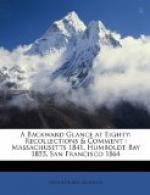Another Boston memory is the Boston Theater, where William Warren reigned. Cinderella and her pumpkin carriage are fresh in my mind. I also recall a waxwork representation of the Birth in the Manger. I still can see the heads of the cattle, the spreading horns, and the blessed Babe.
As I recall my early boyhood, many changes in customs seem suggested. There may be trundle-beds in these days, but I never see them. No fathers wear boots in this era, and bootjacks are as extinct as the dodo. I have kept a few letters written by my mother when I was away from her. They were written on a flat sheet, afterward folded and fastened by a wafer. Envelopes had not arrived; neither had postage-stamps. Sealing-wax was then in vogue and red tape for important documents. In all well-regulated dwellings there were whatnots in the corner with shells and waxworks and other objects of beauty or mild interest. The pictures did not move—they were fixed in the family album. The musical instruments most in evidence were jew’s-harps and harmonicas. The Rollo books were well calculated to make a boy sleepy. The Franconia books were more attractive, and “The Green Mountain Boy” was thrilling. A small boy’s wildest dissipation was rolling a hoop.
And now California casts her shadow. My father was an early victim. I remember his parting admonition, as he was a man of few words and seldom offered advice. “Be careful,” he said, “of wronging others. Do not repeat anything you hear that reflects on another. It is a pretty good rule, when you cannot speak well of another, to say nothing at all.” He must have said more, but that is all that I recall.
Father felt that in two years he would return with enough money to provide for our needs. In the meantime we could live at less expense and in greater safety in the country. We returned to the town we all loved, and the two years stretched to six. We three children went to school, my mother keeping house. In 1851 my grandfather died, and in 1853 my grandmother joined him.
During these Leominster days we greatly enjoyed a visit from my father’s sister, Charlotte, with her husband, John Downes, an astronomer connected with Harvard University. They were charming people, bringing a new atmosphere from their Cambridge home. Uncle John tried to convince me that by dividing the heavens I might count the visible stars, but he did not succeed. He wrote me a fine, friendly letter on his returning home, in 1852, using a sheet of blue paper giving on the third page a view of the college buildings and a procession of the alumni as they left the church Sept. 6, 1836. In the letter he pronounced it a very good view. It is presented elsewhere, in connection with the picture of a friend who entered the university a few years later.




